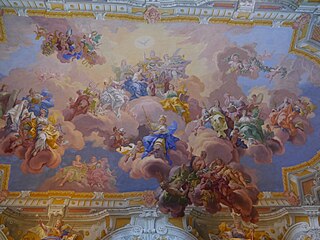
Vor Arneths Grab, WAB 53, is an elegy composed by Anton Bruckner in 1854, for men's voices and three trombones.

The Mayer Cantata, WAB 60, is a cantata composed by Anton Bruckner in 1855. It is the second of three larger-scale occasional compositions, and the composer's first extended composition for large wind ensemble and choir.

The Festgesang, WAB 15, is a cantata composed by Anton Bruckner in 1855.

The cantata Entsagen (Renunciation), WAB 14, is a cantata composed by Anton Bruckner in c. 1851.

The Volkslied, WAB 94, is a patriotic song composed by Anton Bruckner in 1882 for a competition for a Hymne für das Deutsche Volk in Österreich.

"Ständchen" ("Serenade"), WAB 84.2, is a Lied composed by Anton Bruckner in c. 1846.

Der Abendhimmel, WAB 55, is a song composed by Anton Bruckner in 1862.

Herbstlied, WAB 73, is a romantic song composed by Anton Bruckner in 1864. The song, scored for men's choir and two soprano soloists with piano accompaniment, depicts an autumn walking with nightingale song.

Sternschnuppen, WAB 73, is a song, which Anton Bruckner composed for his own men's voice quartet in c. 1848 during his stay in the Sankt Florian.

Du bist wie eine Blume, WAB 64, is a song, which Anton Bruckner composed in 1861.

"An dem Feste", WAB 59a, is a song composed by the 19-year-old Anton Bruckner in 1843 during his stay as schoolteacher's assistant in Kronstorf. In 1893, near the end of his life, Bruckner modified slightly its music score and let Karl Ptak put another text on the song, with as title "Tafellied", WAB 59c.

Das Lied vom deutschen Vaterland, WAB 78, is a patriotic song composed by Anton Bruckner in c. 1845 during his stay in St. Florian.

Der Lehrerstand, WAB 77, is a song composed by Anton Bruckner in c. 1847 during his stay in Sankt Florian.

Das edle Herz, WAB 65, is a song composed by Anton Bruckner in c. 1851 during his stay in St. Florian.

Das edle Herz, WAB 66, is a song composed by Anton Bruckner in December 1857 during his stay in Linz. During his stay in St. Florian, Bruckner had already composed a first setting of the song for men's choir, WAB 65.

Frühlingslied, WAB 68, is a lied composed by Anton Bruckner in 1851 for the name-day of Aloisia Bogner.

Wie bist du, Frühling, gut und treu, WAB 58 is a lied composed by Anton Bruckner in 1856 on a text of Oskar von Redwitz.

Herbstkummer, WAB 72 is a lied composed by Anton Bruckner in 1864.

Mein Herz und deine Stimme, WAB 79 is a lied composed by Anton Bruckner in 1868.



















